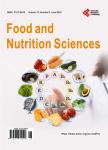Dietary Intervention with Yoghurt, Synbiotic Yogurt or Traditional Fermented Sobya: Bio-Potency among Male Adolescents Using Five Bio-Markers of Relevance to Colonic Metabolic Activities
Dietary Intervention with Yoghurt, Synbiotic Yogurt or Traditional Fermented Sobya: Bio-Potency among Male Adolescents Using Five Bio-Markers of Relevance to Colonic Metabolic Activities作者机构:Children’s Nutrition Research Center Baylor College of Medicine Houston USA Dairy Science National Research Center Giza-Dokki Egypt Departments of Nutrition National Research center Giza-Dokki Egypt
出 版 物:《Food and Nutrition Sciences》 (食品与营养科学(英文))
年 卷 期:2014年第5卷第12期
页 面:1131-1144页
学科分类:1002[医学-临床医学] 100214[医学-肿瘤学] 10[医学]
主 题:Probiotics Egyptian Male Adolescents Intestinal Microbiota Fecal Short Chain Fatty Acids
摘 要:The objective of the present work is to test the effectiveness of probiotic potency of regular yoghurt, synbiotic yoghurt and traditional fermented Egyptian sobya containing endogenous probiotic strains compared to unfermented rice milk porridge. Methods: The study consisted of 28 male subjects with mean age of 13.9 ± 0.1 years. The subjects were divided into four groups, three groups consumed one of three fermented supplements, while the fourth group served as a control group. Stool and urinary samples were carried out prefeeding and after 3-week nutritional intervention for assessing five indicators of revelance to colonic metabolic activities. The fermented supplements used for evaluation were regular yoghurt, synbiotic yoghurt and traditional fermented sobya;while the fourth group was given unfermented rice milk and served as control. Intestinal permeability was assessed by the urinary lactulose mannitol ratio. Results: The mean fecal total lactobacilli counts increased (P 0.05). Mean fecal short chain fatty acids concentrations (acetic;propionic and butyric) tended to increase following the intervention with synbiotic yogurt or sobya compared to respective pre-intervention values;but the difference didn’t attain significance (0.1P 0.05). The 3-week nutritiona



